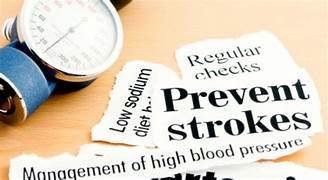Stroke Prevention: Lifestyle Changes and Risk Reduction

Although strokes are one of the leading causes of disability and death globally, many of them can be avoided with minor lifestyle adjustments and risk-reduction techniques.
The following are important actions you can take to reduce your risk of stroke:
- Control Blood Pressure: The single biggest risk factor for stroke is high blood pressure. Regularly check your blood pressure and, if necessary, work with your healthcare provider to modify your lifestyle and take medication to keep it within a healthy range.
- Keep Your Weight in Check: Obesity and overweight raise the risk of stroke. To reach and stay at a healthy weight, strive for a balanced diet full of fruits, vegetables, whole grains, and lean proteins. You should also get regular exercise.
- Give Up Smoking: Smoking damages blood vessels and increases the risk of blood clots, which dramatically increases your risk of stroke. One of the best things you can do for your general health and to reduce your risk of stroke is to stop smoking.
- Limit Alcohol Consumption: Drinking too much alcohol can increase blood pressure and add to other stroke risk factors. Keep your alcohol consumption in check to a moderate level—one drink for women and two for men per day, on average.
- Engage in Regular Exercise: Exercise on a regular basis can help lower blood pressure, manage weight, and enhance cardiovascular health in general. Aim for two or more days of muscle-strengthening activities each week in addition to at least 150 minutes of moderate-intensity aerobic exercise or 75 minutes of vigorous-intensity exercise per week.
- Handle Diabetes: If blood sugar levels are not properly managed, diabetes raises the risk of stroke. To effectively manage diabetes, check your blood sugar levels on a regular basis, maintain a healthy diet, exercise frequently, and take your medications as directed.
- Eat a Healthy Diet: You can lower your risk of stroke and other cardiovascular diseases by following a diet high in fruits, vegetables, whole grains, lean proteins, and low in cholesterol, sodium, and saturated and trans fats.
CONCLUSION
It is possible to considerably reduce your risk of stroke and improve your general health and well-being by adopting these lifestyle modifications into your daily routine and taking care of other risk factors like high cholesterol and atrial fibrillation. Recall that modest adjustments can have a significant impact on preventing strokes.
What's Your Reaction?



















